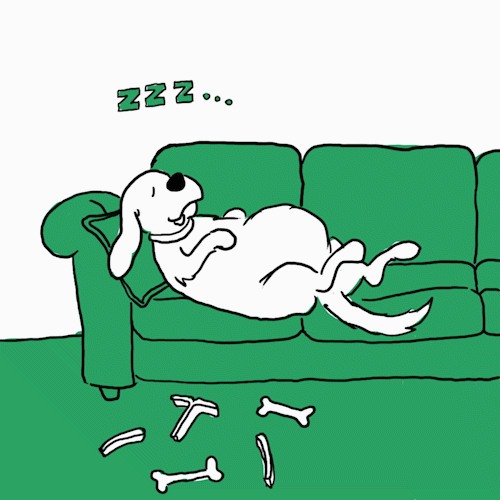

We may often envy our dogs for the kind of life they lead. Chilled, relaxed, and always well-rested. After sleeping like babies all night, dogs have the ability to nap throughout the day. You will find them basking under the sun, dozing off on the couch, or just napping next to your feet. When they do wake up after they’ve had their fat naps, they are full of energy and ready for some serious playtime.
Many animals, like dogs, sleep differently than we humans do. This is a very common reason for dog parents to wonder why my dog is always sleeping. Is my dog sleeping a lot or not enough? If you are wondering how much sleep do dogs need, there is more than one answer to this question. Just like how our sleep cycles change throughout our lives depending on our age, health, lifestyle, etc, a dog’s sleep cycle also changes depending on its age, health, and lifestyle. Keep reading to learn more about how long do dogs sleep, so it’s easier for you to understand your floof’s sleep patterns.
Dogs need a considerable amount of sleep; a lot more than we do. Additionally, carnivores like dogs sleep a lot more than herbivores since sleep is more dangerous for prey animals. The total number of hours a dog needs to sleep for varies on different factors such as its age, its health condition, and the kind of life it leads. Out of all these factors, age matters the most.
Dogs can sleep for around 12-14 hours each day, but puppies can clock in even more hours. This is because the body needs a lot of rest and repair during the first few months of life. Let’s take a look at how age affects the sleep cycle of dogs.
Puppies need to sleep for as long as their body needs to facilitate growth and repair. It is completely normal if your puppy sleeps for most of the day. In fact, puppies tend to sleep more throughout the day and less through the night.
Most adult dogs tend to sleep for anywhere between 8 to 13 hours, averaging around 11 hours each day. Yes, that’s a lot but that’s also a charm for these cute, cuddly floofs. Adult dogs tend to sleep for longer during the night depending on their and their pet parent’s schedule. However, napping for them is equally important. That being said, sleeping for a few hours during the day is absolutely normal.
Senior dogs and middle-aged dogs sleep as much as puppies. They tend to not wake up through the night and nap for a considerable number of hours throughout the day. These hours of sleep make sure that their body is well rested and recovering well as their body continues to age.
We now know that dogs, on average, can sleep for 15 hours a day irrespective of their age. However, every dog is different and will stick to a different routine which is okay. As a pet parent, you will soon understand your floof’s sleeping cycle and how its body functions.
If you do start worrying about your floof sleeping for too long, do not hesitate to contact your vet. It is always better to clear your doubts and take your furry friend to the doctor for a check-up and be sure. Another cause for concern that should be kept in mind is your dog sleeping for longer than usual. This could be a sign of underlying causes such as diabetes, dog depression, anxiety, and more. This is why a visit to the vet whenever you are worried is highly recommended.
There could be many reasons as to why your dog is sleeping so much. Our first thought is always an underlying disease that should be checked out by the vet. While this is highly recommended and also very common, many other reasons can make your dog sleep for very long.
If you’re wondering “Why is my dog always sleeping?”, the answer could be as simple as boredom. Sometimes dogs will resort to sleeping simply because they do not have anything to do. Apart from boredom, stress and anxiety are also major reasons for dogs sleeping too much. If your dog is anxious, you will notice it being lethargic and falling asleep often. The best way to combat this is to establish a routine and include some wholesome playtime.
Your dog can be susceptible to hyperglycaemia if its body is unable to produce the minimum amount of insulin needed. Certain dog breeds are at a higher risk of this disease as compared to other breeds. Visit your vet to diagnose conditions like this early and do the needful.
Viral infections in dogs are highly contagious and can affect your floof’s body greatly. Because of viral infections, your floof’s body will be unable to absorb any nutrients and will leave it dehydrated. Other than that, your floof will also suffer from a lack of protein and recovering from this disease will take some time. Resort to early puppy vaccination to keep occurrences as such at bay.
This infection caused by bacteria is highly contagious and your dog can get this disease easily through direct contact with urine from other dogs. This disease can also be passed on by humans. Again, this disease can drain your floof’s body of energy resulting in it falling asleep way too often.
Poisoning is a reason that should not be neglected by dog owners. If your dog is not trained and will eat anything palatable, it is at risk of poisoning itself. Other than that, many human foods are also poisonous to dogs. Avocados, spices, coffee, cheese, and more are foods that should not be fed to dogs, especially when you're pampering your floof.
Now that you know how much sleep do dogs need on average, you can notice any sudden changes in your dog’s sleep patterns. See a vet immediately if you suspect any illness or disease.
A dog’s sleep cycle depends on its age and lifestyle. For example, it is very normal for a puppy to sleep for around 20 hours a day since their bodies need to rest and repair.
Sometimes, dogs keep sleeping all day because they are bored. The best way to help your dogs in situations as such is to establish a routine that also includes some exciting playtime.
Judging by how much sleep do dogs need, a dog may be stressed if it is sleeping for way too long as compared to how much it should. Another sign of stress in dogs is lethargy.




When it comes to maintaining the overall health of our dogs, we often overlook the importance of their gut health. This is where canine probiotics and prebiotics come into play. These are beneficial microbes that reside in your dog's gastrointestinal system, aiding in food digestion, fighting off potential pathogens, and bolstering the immune system.
Probiotics for dogs, derived from the Latin word 'for' (pro) and the Greek 'life' (bio), are friendly bacteria and yeasts that are essential for your dog's health. They are designed to restore and maintain a healthy balance of microflora in your dog's gut. The types of bacteria usually found in canine probiotics include:
Prebiotics may sound like the opposite of probiotics, but in reality, the two go hand in hand. Prebiotics are nutrients that nourish and promote the growth of these good bacteria already living in the colon. They are essential in ensuring that probiotics function at their optimal best.
Probiotics are a necessary addition to a dog’s diet. Here are a few benefits of this nutrient:
They are generally used when the balance of microbes in a dog's gut gets disrupted due to stress, dietary changes, or antibiotic use, leading to health problems including digestive upsets.
Probiotics for dogs have been shown to help manage diarrhoea and improve gut health. They work by restoring the balance of good bacteria in your dog's gut, which can be disrupted due to various factors.
The benefits of probiotics for dogs extend beyond just good gut health. They can also aid in reducing the need for antibiotic treatment and shorten the duration of diarrhoea. In fact, a 2009 Irish study found that supplementation with a specific strain of Bifidobacterium Animalis reduced diarrhoea duration from seven to four days.
The answer is yes. Puppies can benefit from dog-specific probiotics. These can help them develop a balanced intestinal bacteria ecosystem, support a healthy immune system, and reduce the occurrence of diarrhoea, constipation, and infections of the digestive tract.
Yes, it's critical to consult your vet before introducing probiotics or prebiotics for dogs into your pet's diet. There are many probiotic preparations out there, and not all of them are of high quality and backed up with evidence. Your vet will be able to advise the best option for your dog.
As the importance of gut health in dogs becomes more recognised, various supplements containing canine probiotics have emerged. One such supplement is our IAMS™ Proactive Health™ Digestive Health Supplement. This soft-chew food supplement is a blend of prebiotics and probiotics that ensures healthy digestion.
If your dog has been experiencing signs like diarrhoea, constipation, bloating, or vomiting, it might indicate that their digestive system is not functioning properly. In this case, a probiotic supplement with Bacillus Subtilis and Fructooligosaccharide can be a good investment. They help degrade organic matter in the feces, reducing ammonia production and fecal odour as well as nourish the good bacteria in the colon of the dog.
The benefits of probiotics for dogs are substantial. They help maintain a healthy gut, which plays a vital role in your dog's overall health. By incorporating probiotics into your dog's diet, you're taking a step towards ensuring that your furry friend leads a healthier, happier life.